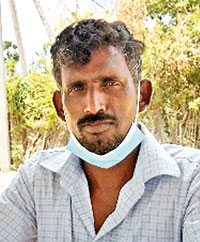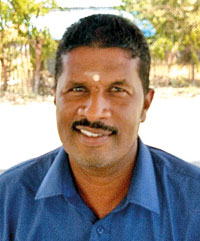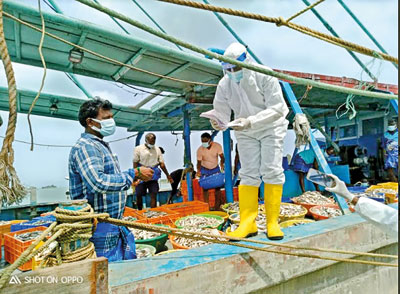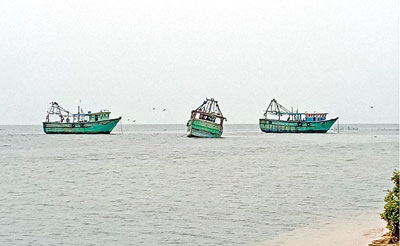News
Equity, justice, dignity and peace for Sri Lankan fishermen?

Stanislaws
An Indian Government statement read out ahead of the recent vote on the resolution on Sri Lanka at the United Nations Human Rights Council in Geneva said: “India’s approach to the question of human rights in Sri Lanka is guided by two fundamental considerations. One is our support to the Tamils of Sri Lanka for equity, justice, dignity and peace. The other is in the ensuring the unity, stability and territorial integrity of Sri Lanka. While an Indian diplomat was making his speech to the UNHRC in Geneva, hundreds of Tamil Nadu trawlers were once again streaming across the International Maritime Boundary Line (IMBL) to fish illegally in Sri Lankan waters; demonstrating scant regard for the territorial integrity of Sri Lanka.

Anarasa
The dignity and peace that Sri Lankan Tamil fishermen have worked tirelessly to achieve in their lives since the end of the civil conflict were shattered overnight, by Tamil owned trawlers. And justice? Nine trawlers were arrested in the days that followed, after protests by fishermen and the seafood industry. But almost immediately the nine vessels and 54 crewmembers were released without charge; allegedly at the request of the Government of India.
Are Sri Lanka’s small scale, fishing communities on the north coast, not entitled to the right to freedom from bias or favouritism, too? Must the dice always fall in favour of Tamil Nadu’s semi-industrial trawl net fisheries employing a few thousand labourers as against Northern Sri Lanka’s 29,000 small-scale fishermen whose only source of livelihood is the hugely productive, highly lucrative and thankfully renewable marine resources on either side of the IMBL in the Palk Bay?
Unsurprisingly sans a meaningful legal deterrent, Tamil Nadu trawlers continued to fish illegally in Sri Lankan waters throughout last week. Fifty or so trawlers operated within 500 metres of the shore off the islands of Delft, Alanaithivu and Eluvaithivu, according to Eluvaithivu Fishermen’s Cooperative Society president T. Stanislaws. Rameshwaram boat owners had the cheek to call Jaffna District Federation of Fishermen’s Cooperative Societies’ Unions president A. Anarasa last week to tell him to warn Jaffna fishermen that hundreds of Rameshwaram trawlers were coming.
This surprising development happened because Jaffna (and Mannar) fishermen have come to accept that Tamil Nadu trawlers may cross the IMBL every Monday, Wednesday and Saturday evenings. This is the so-called ‘three day/four day rule’. The ‘rule’ is a consequence of trawler owners refusing to accept — and the State Government’s inability to implement — a Tamil Nadu state law prohibiting trawling within 2.5 km of the shore – that is in the fishing grounds of small scale Tamil Nadu fishermen.

A Sri Lankan Navy officer inspecting an Indian trawler loaded with fish caught in Sri Lanka's waters
Instead an ‘agreement’ was reached between trawler owners and small scale fishermen to permit trawlers to operate anywhere they like for three days a week and small scale fishermen to fish in their traditional fishing grounds on the other four. Last week, the ‘three day/four day rule’ applied only in Tamil Nadu. In Sri Lankan waters Tamil Nadu trawlers felt emboldened to fish anywhere they liked for six days of the week, which they duly did without fear of arrest or legal consequences.
According to Anarasa, hundreds of Jaffna fishermen lost thousands of rupees worth of nets over the last two weeks. Last month alone, fishermen and fisher societies in Kayts, Delft and Karainagar lost millions of rupees worth of income due to the sudden upsurge in illegal, unregulated and unreported (IUU) fishing by Tamil Nadu trawlers. Who is going to compensate these fishermen for their losses, he asked? Who will buy our fishermen new nets to replace those destroyed by the trawlers? Fishermen on the islands off the coast of Jaffna are now fearful about setting their nets, he said. How can fishermen risk going out to fish, if Tamil Nadu boats continue to trawl with impunity in the fishing grounds of small scale fishermen in Sri Lanka, just like they do in Tamil Nadu? The trawlers will continue to come until April 15, he said. This is when the Indian Government officially closes coastal fisheries for 85 days to allow fish stock on the Indian side of the Palk Bay to recover.

A group of Indian fishermen who were released after they were arrested for poaching in Sri Lankan waters.
The issue of persistent IUU fishing by Tamil Nadu trawlers in Sri Lankan waters is often couched in language that calls for ‘a humanitarian response’: The semantics of equity, justice, dignity and peace that Indian diplomat in Geneva last week. Northern fishermen and fisher leaders like Stanislaws and Anarasa are not asking anything different. They call for:
n Equity for small scale fishermen; the right to fish freely in their traditional fishing grounds without bias or favoritism;
n Justice through the rule of law; the implementation of a meaningful legal deterrent under the Fisheries (Regulation of Foreign Fishing Boats) (Amendment) Act No. 1 of 2018;
n Dignity for small scale fishing communities; rebuilding livelihoods shattered by civil conflict, creating a future for their families based on the sustainable harvest of the Palk Bay’s rich marine resources.
n And peace. Small scale fishermen on both sides of the Palk Bay want to live and fish peacefully.
The ultimate responsibility for delivering equity, justice, dignity and peace for small scale fishermen on both sides of the Palk Bay and respect for Sri Lanka’s territorial integrity lies not in Jaffna or in Colombo, but in Chennai and New Delhi.

Indian vessels fishing in waters close to Sri Lanka's northern shores
(Steve Creech works with
fishing communities, the seafood industry and the government of Sri Lanka on sustainable
fisheries and eco-labelling of
Sri Lankan seafood products. steve@pelagikos.lk)


